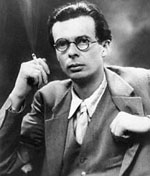 Aldous Huxley was
born on 26 July 1894. His grandfather was a
famous biologist, his brother a renowned
zoologist, his mother a novelist and his
great-uncle was a poet. His mother died when he
was 14 and his brother committed suicide a few
years later. Aldous Huxley was
born on 26 July 1894. His grandfather was a
famous biologist, his brother a renowned
zoologist, his mother a novelist and his
great-uncle was a poet. His mother died when he
was 14 and his brother committed suicide a few
years later.
Huxley
lost almost all his sight as a teenager. He
worked as a teacher at Eton and published four
books of poetry before writing his first novel.
He published his most famous novel, Brave
New World in 1932. It
depicted a dark picture of the future.
In
1937 he moved to the United States where he wrote
film scripts and became friends with famous
actors, writers and scientists.
The
range of Huxley's interests included Greek
history, Polynesian anthropology, translations
from Sanskrit and Chinese of Buddhist texts,
scientific papers on pharmacology,
neurophysiology, psychology and education,
together with novels, poems, critical essays,
travel books, political commentaries and
conversations with all kinds of people, from
philosophers to actresses.
One
of the philosophers that deeply influenced Huxley
was Jiddu Krishnamurti. He was drawn to his
liberating message. "Artists, visionaries
and mystics refuse to be enslaved to the
culture-conditioned habits of feeling, thought
and action which their society regards as right
and natural," said Huxley. "Whenever
this seems desirable, they deliberately refrain
from projecting upon reality those hallowed word
patterns with which all human minds are so
copiously stocked. They know as well as anyone
else that culture and the language in which any
given culture is rooted, are absolutely necessary
and that, without them, the individual would not
be human. But more vividly than the rest of
mankind they also know that, to be fully human,
the individual must learn to decondition himself,
must be able to cut holes in the fence of
verbalized symbols that hems him in."
Huxley
was an early environmentalist as well as a
pacifist. He was refused American citizenship
because he would not say his pacifism was a
matter of his religion, which might have made him
an acceptable conscientious objector.
He
lost all his books and papers in a fire at his
home after which he called himself "a man
without a past".
Huxley
remained nearly blind all his life. He died
November 22, 1963, the same day that President
John F. Kennedy was assassinated. He was
cremated, and his ashes were buried in his
parents' grave in England.
|